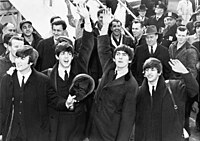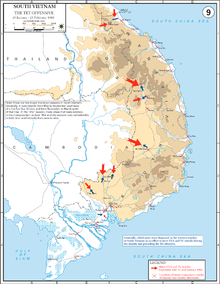The 1960s Portal
The 1960s became synonymous with the new, radical, and subversive events and trends of the period. In Africa the 1960s was a period of radical political change as 32 countries gained independence from their European colonial rulers. Some commentators have seen in this era a classical Jungian nightmare cycle, where a rigid culture, unable to contain the demands for greater individual freedom, broke free of the social constraints of the previous age through extreme deviation from the norm. Christopher Booker charts the rise, success, fall/nightmare and explosion in the London scene of the 1960s. However, this alone does not explain the mass nature of the phenomenon. Several nations such as the U.S., France, Germany and Britain turned to the left in the early and mid 1960s. In the United States, John F. Kennedy, a Keynesian and staunch anti-communist, pushed for social reforms. His assassination in 1963 was a stunning shock. Liberal reforms were finally passed under Lyndon B. Johnson including civil rights for African Americans and healthcare for the elderly and the poor. Despite his large-scale Great Society programs, Johnson was increasingly reviled by the New Left at home and abroad. The heavy-handed American role in the Vietnam War outraged student protestors across the globe, as they found peasant rebellion typified by Ho Chi Minh and Che Guevara more appealing. Italy formed its first left-of-center government in March 1962 with a coalition of Christian Democrats, Social Democrats, and moderate Republicans. Socialists joined the ruling block in December 1963. In Britain, the Labour Party gained power in 1964. In Brazil, João Goulart became president after Jânio Quadros resigned. This is a Featured article, which represents some of the best content on English Wikipedia..
On June 5, 1968, Robert F. Kennedy was shot by Sirhan Sirhan at the Ambassador Hotel in Los Angeles, California, and pronounced dead the following day. Kennedy, a United States senator and candidate in the 1968 Democratic Party presidential primaries, won the California and South Dakota primaries on June 4. He addressed his campaign supporters in the Ambassador Hotel's Embassy Ballroom. After leaving the podium, and exiting through a kitchen hallway, he was mortally wounded by multiple shots fired by Sirhan. Kennedy died at Good Samaritan Hospital nearly 25 hours later. His body was buried at Arlington National Cemetery. (Full article...)This is a Good article, an article that meets a core set of high editorial standards.
The Wild Bunch is a 1969 American epic revisionist Western film directed by Sam Peckinpah and starring William Holden, Ernest Borgnine, Robert Ryan, Edmond O'Brien, Ben Johnson and Warren Oates. The plot concerns an aging outlaw gang on the Mexico–United States border trying to adapt to the changing modern world of 1913. The film was controversial because of its graphic violence and its portrayal of crude men attempting to survive by any available means. The screenplay was co-written by Peckinpah, Walon Green, and Roy N. Sickner. The Wild Bunch was filmed in Technicolor and Panavision, in Mexico, notably at the Hacienda Ciénaga del Carmen, deep in the desert between Torreón and Saltillo, Coahuila, and on the Nazas River. (Full article...)Selected picture - Charlton Heston (1923–2008) was an American actor of film, theatre and television who is known for heroic roles in films such as The Ten Commandments, Ben-Hur (for which he won the Academy Award for Best Actor), El Cid, and Planet of the Apes. Heston was also known for his political activism. In the 1950s and 1960s he was one of a handful of Hollywood actors to speak openly against racism, and was an active supporter of the Civil Rights Movement. Initially a moderate Democrat, he later supported conservative Republican policies and was president of the National Rifle Association from 1998 to 2003.
Did you know -
Related portalsThis is a Featured article, which represents some of the best content on English Wikipedia..
Peter Sellers CBE (born Richard Henry Sellers; 8 September 1925 – 24 July 1980) was an English actor and comedian. He first came to prominence performing in the BBC Radio comedy series The Goon Show. Sellers featured on a number of hit comic songs, and became known to a worldwide audience through his many film roles, among them Chief Inspector Clouseau in The Pink Panther series. Born in Southsea, Sellers made his stage debut at the Kings Theatre, Southsea, when he was two weeks old. He began accompanying his parents in a variety act that toured the provincial theatres. He first worked as a drummer and toured around England as a member of the Entertainments National Service Association (ENSA). He developed his mimicry and improvisational skills during a spell in Ralph Reader's wartime Gang Show entertainment troupe, which toured Britain and the Far East. After the war, Sellers made his radio debut in ShowTime, and eventually became a regular performer on various BBC Radio shows. During the early 1950s, Sellers, along with Spike Milligan, Harry Secombe and Michael Bentine, took part in the successful radio series The Goon Show, which ended in 1960. (Full article...)This is a Good article, an article that meets a core set of high editorial standards.
Keith Richards (born 18 December 1943) is an English musician, songwriter, singer and record producer who is an original member, guitarist, secondary vocalist, and co-principal songwriter of the Rolling Stones. His songwriting partnership with the band's lead vocalist Mick Jagger is one of the most successful in history. His career spans over six decades, and his guitar playing style has been a trademark of the Rolling Stones throughout the band's career. Richards gained press notoriety for his romantic involvements and illicit drug use, and he was often portrayed as a countercultural figure. First professionally known as Keith Richard, by the early 1970s he had fully asserted his family name. Richards was born in and grew up in Dartford, Kent. He studied at the Dartford Technical School and Sidcup Art College. After graduating, Richards befriended Jagger, Bill Wyman, Charlie Watts, Ian Stewart and Brian Jones and joined the Rolling Stones. As a member of the Rolling Stones, Richards also sings lead on some Stones songs. Richards typically sings lead on at least one song a concert, including "Happy", "Before They Make Me Run", and "Connection". Outside of his career with the Rolling Stones, Richards has also played with his own side-project, The X-Pensive Winos. He also appeared in two Pirates of the Caribbean films as Captain Teague, father of Jack Sparrow, whose look and characterisation was inspired by Richards himself. (Full article...)Selected article -The Tet Offensive was a major escalation and one of the largest military campaigns of the Vietnam War. The Viet Cong (VC) and North Vietnamese People's Army of Vietnam (PAVN) launched a surprise attack on 30 January 1968 against the forces of the South Vietnamese Army of the Republic of Vietnam (ARVN), the United States Armed Forces and their allies. It was a campaign of surprise attacks against military and civilian command and control centers throughout South Vietnam. The name is the truncated version of the Lunar New Year festival name in Vietnamese, Tết Nguyên Đán, with the offense chosen during a holiday period as most ARVN personnel were on leave. The purpose of the wide-scale offensive by the Hanoi Politburo was to trigger political instability in a belief that mass armed assault on urban centers would trigger defections and rebellions. The offensive was launched prematurely in the early morning hours of 30 January in large parts of the I and II Corps Tactical Zones of South Vietnam. This early attack allowed allied forces some time to prepare defensive measures. When the main operation began during the early morning hours of 31 January, the offensive was countrywide; eventually more than 80,000 PAVN/VC troops struck more than 100 towns and cities, including 36 of 44 provincial capitals, five of the six autonomous cities, 72 of 245 district towns and the southern capital. The offensive was the largest military operation conducted by either side up to that point in the war. (Full article...)More Did you know (auto generated)
TopicsCategoriesWikiProjects
Associated WikimediaThe following Wikimedia Foundation sister projects provide more on this subject:
Discover Wikipedia using portals |
© MMXXIII Rich X Search. We shall prevail. All rights reserved. Rich X Search





























